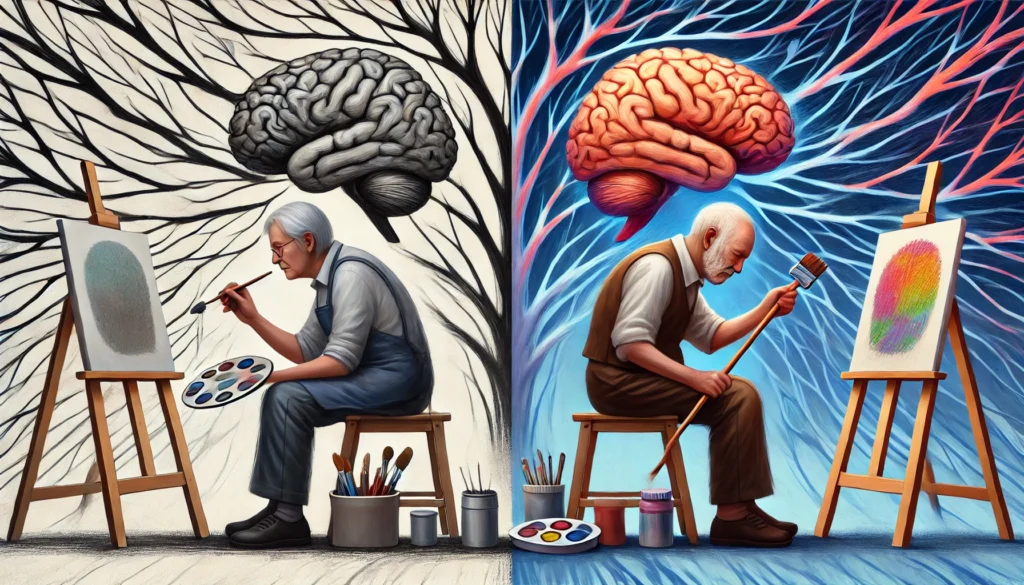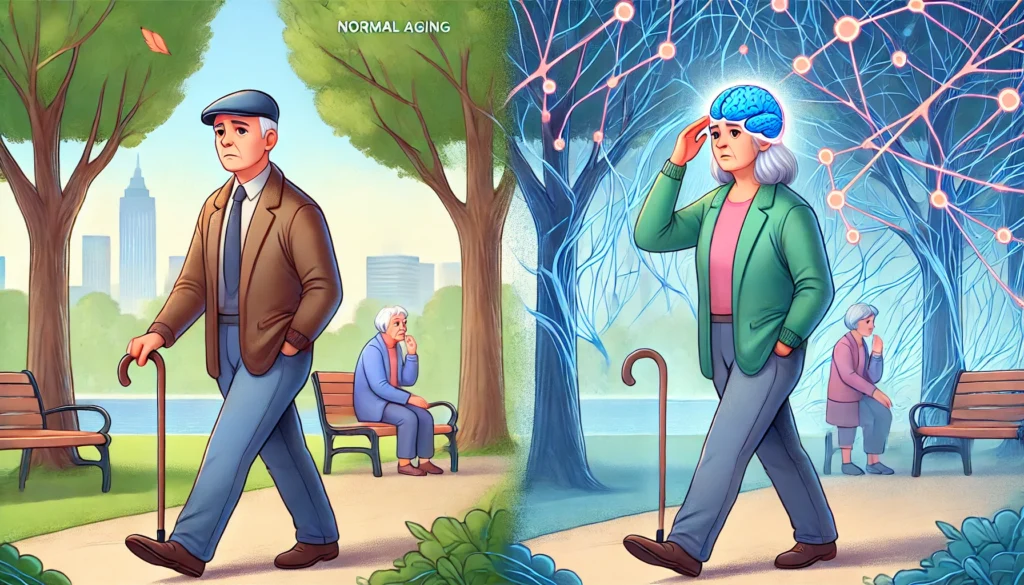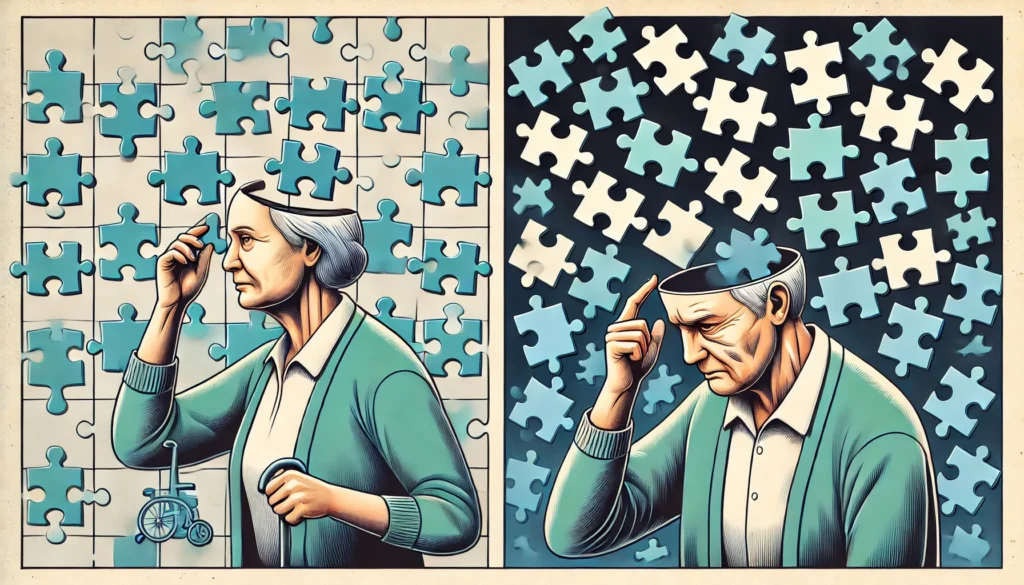Normal aging encompasses a wide range of changes that occur as part of the natural aging process. It includes physical, cognitive, and emotional changes that occur over time. While these changes can sometimes be unsettling, they are typical and expected. Understanding these changes can help individuals and their families prepare for and adapt to the aging process, ensuring that the golden years are lived to the fullest.
You may also like: Tips to Improve Low Average Memory Performance
Physical Changes
As we age, our bodies undergo several physical changes. Muscle mass decreases, bones become more brittle, and skin loses elasticity. These changes, while part of the normal aging process, can lead to difficulties in mobility and increased susceptibility to injuries.
Musculoskeletal Adjustments
The musculoskeletal system, which includes muscles, bones, and joints, experiences significant changes with age. Muscle fibers shrink, leading to a decrease in overall muscle mass and strength. This can affect balance and coordination, increasing the risk of falls. Bones lose density, making them more prone to fractures. Regular exercise, including strength training and weight-bearing activities, can help mitigate these effects and maintain mobility.
Cardiovascular and Respiratory Changes
The heart and blood vessels also undergo changes, with arteries becoming stiffer and less flexible. This can lead to increased blood pressure and a higher risk of cardiovascular diseases. The lungs may lose some of their elasticity, reducing respiratory efficiency. However, maintaining a healthy lifestyle, including regular physical activity and a balanced diet, can support cardiovascular and respiratory health well into later years.
Skin and Sensory Alterations
Aging skin becomes thinner, less elastic, and more prone to wrinkles and bruising. Sensory changes may include decreased vision and hearing, impacting daily activities. Protecting the skin from excessive sun exposure, staying hydrated, and using moisturizers can help maintain skin health. Regular check-ups with eye and ear specialists are also essential to address sensory changes and maintain quality of life.
Cognitive Changes
Cognitive changes in aging often include slower processing speeds and mild memory lapses. For example, forgetting where you placed your keys or occasionally struggling to recall a name are common experiences. These changes are generally manageable and don’t significantly interfere with daily life.
Memory and Information Processing
As the brain ages, it may take longer to process information, and short-term memory might decline slightly. This is why older adults may take longer to learn new things or remember recent events. However, long-term memory, or the ability to recall information from the past, often remains stable. Engaging in mental exercises, such as puzzles or learning new skills, can help keep the mind sharp.
Attention and Multitasking
Older adults may find it more challenging to concentrate on multiple tasks at once or switch quickly between tasks. This can make multitasking difficult. Focusing on one task at a time and minimizing distractions can help manage these changes. Mindfulness practices and memory aids can also support cognitive function.
Language and Communication
While older adults may occasionally struggle to find the right words, basic language abilities remain intact. Engaging in conversations, reading, and writing can help maintain language skills. Social interactions and staying mentally active are crucial in preserving communication abilities.

Emotional Changes
Emotionally, aging can bring about shifts in mood and personality. It is normal to experience periods of sadness or anxiety due to life changes such as retirement or the loss of loved ones. However, these changes are typically temporary and manageable.
Coping with Life Transitions
Major life changes, such as retirement or the death of a spouse, can lead to feelings of loss or anxiety. Developing healthy coping mechanisms, such as seeking social support, engaging in hobbies, or joining community groups, can help manage these emotions. Professional counseling or support groups can also provide valuable assistance during challenging times.
Maintaining Emotional Well-being
As individuals age, maintaining emotional well-being becomes increasingly important. Regular physical activity, a nutritious diet, and sufficient sleep contribute to emotional health. Pursuing passions and maintaining social connections can also enhance mood and overall satisfaction with life.
Recognizing Depression and Anxiety
While temporary sadness is common, persistent depression or anxiety should be addressed. Older adults may exhibit symptoms differently, such as irritability or withdrawal. It’s important to recognize these signs and seek professional help when needed. Early intervention and treatment can significantly improve quality of life.
Dementia: More Than Just Aging
Dementia is not a single disease but a term that describes a range of symptoms affecting memory, thinking, and social abilities severely enough to interfere with daily life. Alzheimer’s disease is the most common cause of dementia, but other conditions can also lead to dementia. Understanding the complexities of dementia is crucial for providing the right support and care.
Key Differences Between Normal Aging and Dementia
1. Memory Loss: While normal aging might involve occasional forgetfulness, dementia involves frequent memory lapses that disrupt daily activities. For instance, forgetting important events or repeatedly asking the same questions.
Nature of Memory Loss
Memory loss in dementia is more profound and persistent than in normal aging. Individuals may forget significant events, fail to recognize familiar faces, or repeat themselves frequently. These memory lapses often interfere with daily life and safety, such as forgetting to turn off appliances or wandering away from home.
2. Problem Solving and Planning: Individuals with dementia often struggle with planning and solving problems. This might manifest as difficulty following a recipe or managing finances—tasks they previously handled with ease.
Challenges in Cognitive Function
Dementia affects the ability to perform complex tasks that require planning and problem-solving. Individuals may struggle with following step-by-step instructions or balancing a checkbook. These difficulties can lead to frustration and anxiety, highlighting the importance of structured routines and support systems.
3. Confusion with Time and Place: It’s normal to occasionally forget the day of the week, but people with dementia might lose track of dates, seasons, and the passage of time, often feeling lost in familiar surroundings.
Disorientation and Spatial Awareness
People with dementia may become disoriented in familiar environments, such as their own neighborhood. They might forget where they are or how they got there, leading to feelings of confusion and fear. It’s essential to provide a safe and structured environment to help manage these challenges.
4. Language Difficulties: Normal aging might involve occasional trouble finding the right word, whereas dementia can lead to severe difficulties in following or joining a conversation, often repeating themselves without realizing it.
Impact on Communication
Dementia can significantly impair language skills, making it difficult to follow conversations or express thoughts clearly. Individuals may struggle to find words, use incorrect words, or repeat themselves frequently. Communication aids and patience can help facilitate interactions.
5. Misplacing Things: While anyone can misplace items from time to time, individuals with dementia might put things in unusual places and be unable to retrace their steps to find them.
Handling Everyday Tasks
Misplacing items frequently and in illogical places is a common symptom of dementia. Individuals may put items in inappropriate locations, such as placing keys in the refrigerator, and be unable to recall where they left them. Labeling and organizing personal spaces can help manage these issues.
The Role of Early Detection
Early detection of dementia is vital for several reasons. It allows for planning and setting up care arrangements, discussing treatment options, and potentially slowing the progression of symptoms through medications and lifestyle changes. Proactive measures can significantly enhance the quality of life for individuals and their families.
Screening and Diagnosis
Healthcare providers use various tools to screen for dementia. Cognitive tests, neurological exams, and brain imaging can help diagnose dementia and differentiate it from normal aging.
Cognitive Testing and Assessments
Cognitive tests assess memory, problem-solving, and language abilities to identify potential cognitive decline. These tests, often conducted by neurologists or geriatric specialists, provide a comprehensive understanding of an individual’s cognitive state. Early diagnosis can lead to more effective management and treatment plans.
Neurological and Imaging Techniques
Neurological exams and imaging techniques, such as MRI or CT scans, help identify changes in brain structure and function. These tools can detect abnormalities that may indicate dementia, enabling healthcare providers to tailor interventions accordingly. Timely diagnosis is crucial for implementing appropriate care strategies.

Importance of Regular Check-ups
Regular medical check-ups and screenings are essential for early detection of cognitive changes. Families and caregivers should be vigilant about changes in behavior or memory and seek medical advice promptly. Early intervention can make a significant difference in managing symptoms.
Lifestyle and Intervention Strategies
Certain lifestyle choices can help manage or even slow the progression of dementia symptoms. These include engaging in regular physical activity, maintaining social connections, eating a balanced diet, and staying mentally active through puzzles or learning new skills.
Physical Activity and Brain Health
Regular physical activity, such as walking or swimming, promotes cardiovascular health and enhances brain function. Exercise increases blood flow to the brain, supporting cognitive health and potentially delaying dementia onset. Incorporating physical activity into daily routines is a proactive step toward maintaining mental acuity.
Social Engagement and Cognitive Stimulation
Social interactions and cognitive stimulation are vital for brain health. Engaging in community activities, joining clubs, or participating in group classes fosters mental engagement and emotional well-being. Activities that challenge the brain, such as puzzles or learning new languages, can help preserve cognitive function.
Nutrition and Brain Function
A balanced diet rich in fruits, vegetables, whole grains, and lean proteins supports brain health. Omega-3 fatty acids, found in fish and nuts, are particularly beneficial for cognitive function. Staying hydrated and avoiding excessive alcohol intake are also important for maintaining mental clarity.

Conclusion: Navigating Aging with Insight
Understanding the distinctions between normal aging and dementia is crucial for individuals, families, and caregivers. While some changes are natural and expected, others may signal the onset of dementia. Awareness and early intervention can make a significant difference in managing symptoms and improving quality of life.
By recognizing the signs and symptoms, we can take proactive steps to support loved ones and ourselves as we navigate the complexities of aging. Staying informed and engaged with healthcare professionals can aid in making the best decisions for health and wellness in the later stages of life.
Empowering Families and Caregivers
Families and caregivers play a pivotal role in supporting individuals experiencing cognitive changes. Providing education and resources can empower them to make informed decisions and provide compassionate care. Support groups and counseling can also offer valuable emotional support.
Advocating for Health and Wellness
Advocating for a proactive approach to health and wellness is essential as we age. Encouraging regular medical check-ups, healthy lifestyle choices, and mental engagement can promote longevity and quality of life. Communities and healthcare systems should work together to support aging populations.
Embracing the Aging Journey
Aging is a natural part of life, and embracing the journey with understanding and acceptance can lead to a more fulfilling experience. Celebrating achievements, cherishing relationships, and maintaining a positive outlook are key to navigating the aging process with grace and resilience. In conclusion, while aging brings about certain inevitable changes, not all of them should be attributed to dementia. By understanding these differences, we can better support those affected and ensure a healthier, more fulfilling aging process.
Further Reading:
The differences between normal aging and dementia
Important Note: The information contained in this article is for general informational purposes only, and should not be construed as health or medical advice, nor is it intended to diagnose, prevent, treat, or cure any disease or health condition. Before embarking on any diet, fitness regimen, or program of nutritional supplementation, it is advisable to consult your healthcare professional in order to determine its safety and probable efficacy in terms of your individual state of health.
Regarding Nutritional Supplements Or Other Non-Prescription Health Products: If any nutritional supplements or other non-prescription health products are mentioned in the foregoing article, any claims or statements made about them have not been evaluated by the U.S. Food and Drug Administration, and such nutritional supplements or other health products are not intended to diagnose, treat, cure, or prevent any disease.


